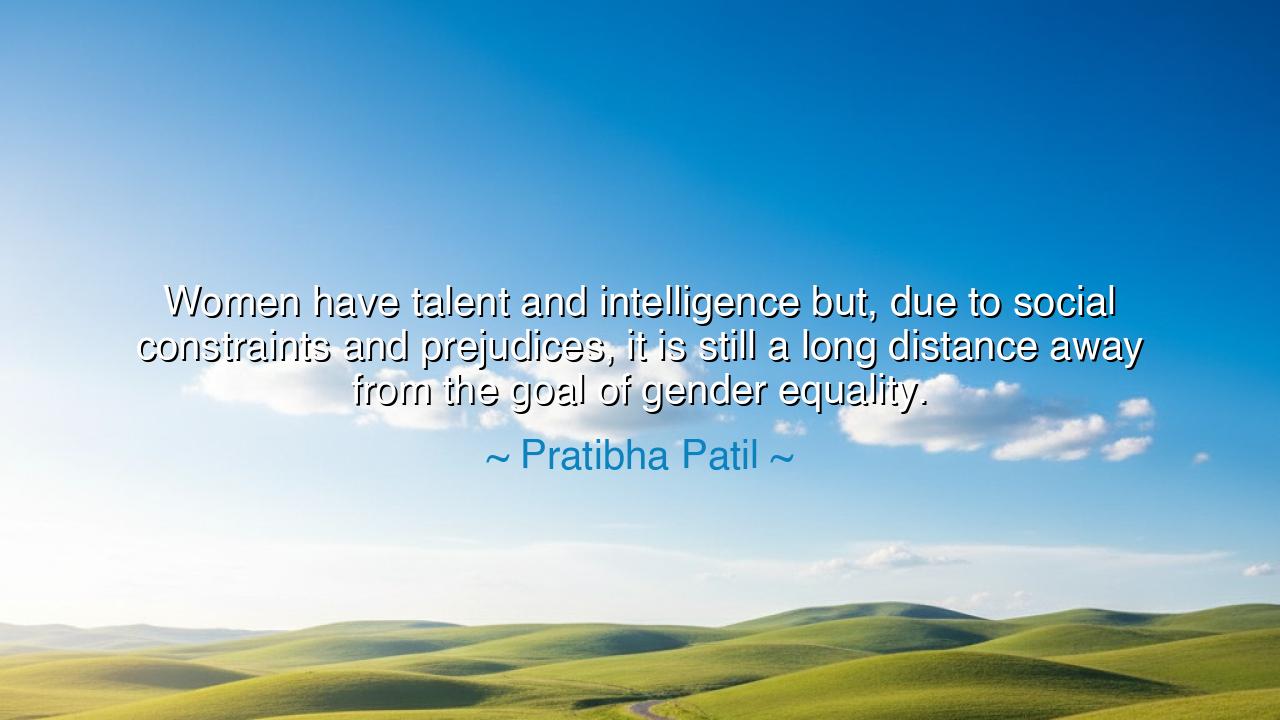
Women have talent and intelligence but, due to social constraints
Women have talent and intelligence but, due to social constraints and prejudices, it is still a long distance away from the goal of gender equality.






The noble leader and philosopher Pratibha Patil, the first woman to rise to the highest office of India, once declared: “Women have talent and intelligence but, due to social constraints and prejudices, it is still a long distance away from the goal of gender equality.” These words, simple yet profound, flow like a river of truth through the landscape of history. They carry within them both sorrow and hope — sorrow for the centuries in which the voices of women have been silenced, and hope for the dawn of an age when their light will no longer be dimmed by injustice. In her statement, Patil names the paradox of our time: though the intelligence and talent of women are boundless, invisible chains of custom and prejudice still hold them from fulfilling their highest destinies.
To understand her meaning, we must first recognize what Pratibha Patil represents — not merely a political figure, but a symbol of what becomes possible when a woman breaks the walls that confine her. Rising from a modest village in Maharashtra to become the President of India, she embodied the triumph of perseverance over limitation. Her journey itself was a living answer to her own words, for she knew from experience how many barriers a woman must overcome — social expectations, cultural stereotypes, and the burden of inequality — to stand as an equal in a world shaped by men. When she speaks of the “long distance” to gender equality, she speaks not of despair, but of clarity — a call to keep walking, to keep building the road that future generations of women will travel upon freely.
Her wisdom reaches beyond geography or nation; it speaks to the entire human story. From the dawn of civilization, women have possessed the same divine spark of intelligence as men. They have dreamed, created, led, and nurtured — yet time and again, their genius has been overshadowed by custom and silence. The poetess Sappho, whose verses once shook ancient Greece, saw her works burned by priests who deemed women’s voices dangerous. Hypatia of Alexandria, the philosopher and mathematician, was slain by those who could not bear her wisdom. Even in modern times, pioneers like Marie Curie, though crowned with two Nobel Prizes, had to fight suspicion and exclusion merely for daring to think. Thus, Patil’s words echo through millennia of resistance, calling us to remember that every step toward equality is not a gift bestowed — it is a right reclaimed.
But though history has been harsh, it has also been illuminated by those women who refused to surrender their light. Malala Yousafzai, a girl whose only weapon was her belief in education, defied tyranny with her voice and survived a bullet to the head. Rosa Parks, weary from injustice, remained seated in defiance and moved a nation toward freedom. These women did not ask for privilege — they demanded justice. And in their courage, they revealed what Patil calls “talent and intelligence”: not merely intellect, but the moral brilliance of the soul that refuses to bow before fear. Their victories are not isolated; they are sparks in the greater fire of awakening that now burns across the world.
Yet, as Pratibha Patil reminds us, the journey is not complete. Prejudices still whisper in households and workplaces; traditions still shackle dreams under the guise of virtue. In many corners of the earth, the girl child is denied education, the working woman is denied equal pay, and the leader is denied legitimacy. The distance to equality is measured not in miles, but in mindsets. It is not laws alone that must change, but hearts. For when society looks upon a woman and sees not her humanity but her gender, it wounds itself, depriving the world of half its wisdom and half its strength.
To close this distance, Patil’s teaching offers both challenge and direction. The first task lies within each individual: to recognize and uproot prejudice wherever it hides — in speech, in habit, in the quiet assumptions we inherit from generations past. The second task lies in collective action: to build systems that empower, not exclude; to educate every girl as we would every boy; to create spaces where the intellect of women is not merely tolerated, but celebrated. A society that honors both its daughters and its sons equally stands not only on the side of justice but on the side of progress. For when women rise, humanity rises with them.
Let this be the wisdom handed down to the generations that follow: talent and intelligence are the birthright of all souls, regardless of gender. But potential, if chained, becomes sorrow. Do not let the old prejudices of the world decide what a woman may dream, where she may walk, or what she may become. For in the emancipation of women lies the liberation of mankind itself. As Pratibha Patil teaches, we must walk this road — patiently, steadfastly, together — until the light of equality shines not as a promise, but as a living truth.
And on that day, when every girl is free to learn, to lead, and to love her own destiny, humanity will have completed its long pilgrimage — not only toward gender equality, but toward the fulfillment of its own divine intelligence.






AAdministratorAdministrator
Welcome, honored guests. Please leave a comment, we will respond soon